Australian Open: torrid two weeks ends badly for Andy Murray
Another defeat in the final of the Australian Open to Novak Djokovic earns Murray an unwanted record
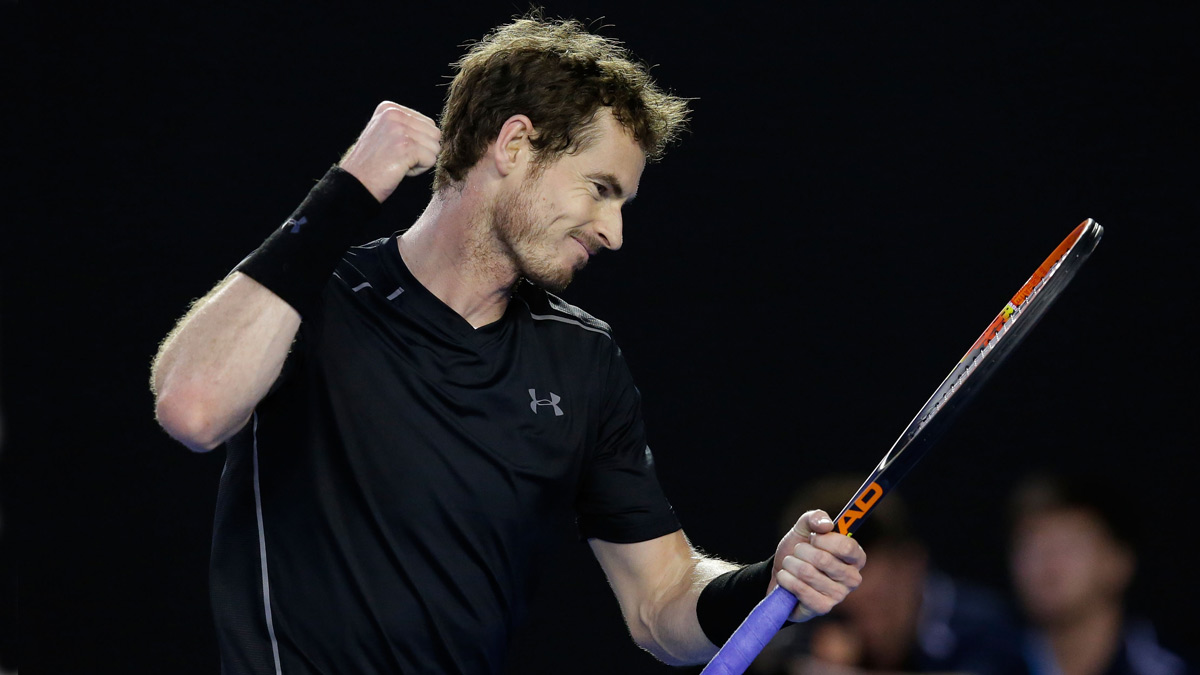
A free daily email with the biggest news stories of the day – and the best features from TheWeek.com
You are now subscribed
Your newsletter sign-up was successful
Andy Murray's miserable run at the Australian Open continued on Sunday as the Scot lost in straight sets to world number one Novak Djokovic. The 28-year-old Murray has reached the final of the Australian Open on five occasions, and lost each time, four times to Djokovic.
The latest defeat was one of the more one-sided, with Murray going down 6-1 7-5 7-6 (7-3) in just under three hours. It means that the number two seed is only the second man to lose five finals at the same Grand Slam since the open era began in 1968. The other player is Murray's former coach Ivan Lendl, who suffered five defeats at the US Open between 1982 and 1989, although he also won three times in that timespan.
In fairness to Murray, he's had a lot to contend with this past fortnight, reports [1]The Guardian, what with the collapse of his father-in-law last week, and the imminent birth of his first child.
The Week
Escape your echo chamber. Get the facts behind the news, plus analysis from multiple perspectives.

Sign up for The Week's Free Newsletters
From our morning news briefing to a weekly Good News Newsletter, get the best of The Week delivered directly to your inbox.
From our morning news briefing to a weekly Good News Newsletter, get the best of The Week delivered directly to your inbox.
Not surprisingly, therefore, Murray's thoughts were with his wife during an emotional post-match speech in which he fought back tears. "It's very tough for me," he said. "But thank you to the fans for coming. To all the ex-players, thank you for coming, it makes coming here and playing this match extra special. And finally to my wife, Kim, who is watching back home. You've been a legend the last two weeks. I'll be on the next flight home."
Murray had begun his speech with a handsome tribute to Djokovic, who has now won the Australian Open six times. "It's an incredible feat," the Briton told the crowd, "so I want to say well done to him and his team."
In winning his sixth Melbourne title, the 28-year-old Serb equalled the record of Australia's Roy Emerson (established in 1967) and the smart money will on Djokovic to win again at Melbourne in the coming years, now that his two main rivals, Rafa Nadal and Roger Federer are both on the wane. The latter's tally of 17 Grand Slam titles will be increasingly on Djokovic's mind given that he's now won 11, the same number as the legendary Bjorn Borg and Rod Laver.
Djokovic has triumphed in four of the past five major tournaments but when it was put to him that he's simply too good for the rest of the world right now, he replied: "I don't want to allow myself to be in that frame of mind. Because if I do, the person becomes too arrogant and thinks that he's a higher being or better than everyone else. You can get a big slap from karma very soon. I don't want that."
A free daily email with the biggest news stories of the day – and the best features from TheWeek.com
And Djokovic had some consoling words for Murray to take with him on the long flight back to the U.K. "I wish you and Kim good luck for the birth of your child and I hope you will experience a feeling like no other before - that's what happened to me and my wife. I wish you all the best."
Australian Open: Murray will make history against Djokovic
29 January
History beckons for Andy Murray on Sunday, when he will either win his first Australian Open title or become its unluckiest player.
The Scot will be playing in his fifth Melbourne final - and the fourth against his nemesis, Novak Djokovic. Defeat would mean an unwanted record for the player as no-one in the modern era has lost five finals at the same tournament.
With his wife, Kim, heavily pregnant at home in Britain and his father-in-law collapsing at the tournament, it has been, says The Guardian, a fortnight of "anguish and struggle" for Murray "and there almost certainly is more to come against Novak Djokovic on Sunday".
Murray made the final after a five-set showdown with up and coming Canadian Milos Raonic. He eventually won 4-6, 7-5, 6-7, 6-4, 6-2 in a little more than four hours, as his opponent was hampered by a leg injury.
"Superior physical sturdiness, mental strength and experience saw Murray through against a volley of 23 aces from the strings of the hugely improved Canadian," says Barry Flatman of The Times. "He now has to overcome the additional handicap of knowing that the world No 1 has been afforded an extra day to rest and recuperate in his bid to win the title for a sixth time."
Djokovic will be favourite after his demolition of Roger Federer on Thursday, but Murray will recover from his exertions today and has the ability to finally claim the elusive title, says BBC pundit Pat Cash.
"This match won't take an awful lot out of Murray - the rallies weren't that long. He was moving very well at the end and was playing confidently. He knows where he failed in last year's final against Djokovic," he says.
BBC tennis correspondent Russell Fuller agrees and does not see Djokovic as unbeatable. "Maybe last year Murray didn't believe he could beat Djokovic, but now he's more confident in his abilities and Djokovic has been a bit off-key at times," he says.
No matter what happens on Sunday, Murray will also take another positive record away from the tournament, notes the Daily Telegraph.
"Murray and his brother Jamie – who plays in the men's doubles final tomorrow – have also set an Open-era record here by becoming the first pair of brothers to reach two different grand-slam finals."
Australian Open: Konta joins the tennis elite despite loss
28 January
Johanna Konta's extraordinary run at the Australian Open came to an end as she lost to number seven seed Angelique Kerber in the semi-final.
Konta had seen off experienced seeds including Venus Williams and Ekaterina Makarova to became the first British woman to make the final four of a Grand Slam since 1983, but her luck ran out against the German, who triumphed 7-5 6-2 in Melbourne.
Makarova will now face Serena Williams, who destroyed Poland's Agnieszka Radwanska 6-0, 6-4 in the other semi-final.
Konta's performances have "undeniably earned her a position of respect amongst the world's leading players", says Barry Flatman, in The Times, but she was found wanting in the biggest game of her career to date.
The 24-year-old Briton hit more winners than her opponent but lost five service games and finished with 36 unforced errors to Makarova's 11.
"Big-match experience, greater court craft and far fewer unforced errors dictated that Kerber, of Germany, rather than Konta, the British number one, will face the daunting task of trying to deny Serena Williams a 22nd Grand Slam title and a seventh Australian Open crown," says Flatman.
Konta may not have made the final, but her reward for getting to the last four is not insignificant. In addition to the £400,000 prize money is the invaluable experience of playing at the sharp end of a Grand Slam and a huge leap in her ranking.
She will be the world number 28 when the new rankings are unveiled next week and her run in Australia will "will stand her in great stead in the years to come", says Russell Fuller, of the BBC. "She has an excellent chance of being seeded for both the French Open and Wimbledon and has already earned the right to play in any tournament she chooses to - anywhere in the world."
The Australian-born player, whose parents are Hungarian and who holds three passports, has been "the talk of the tournament", says Kevin Mitchell, of The Guardian.
Australia has tried to claim her as one of their own and although Konta has remained steadfastly British in her dealings with the media, she has become popular with the local support.
After defeat "the crowd stood to acclaim her", writes Mitchell. "They weren’t bothered where she was from, but probably will take much interest in where she is going."
Australian Open: Johanna Konta powers into semi-finals
27 January
Johanna Konta has made the semi-finals of the Australian Open and is now one match away from becoming the first British woman to reach a Grand Slam final in 39 years.
Konta beat China's Shuai Zhang 6-4, 6-1 in the quarter-finals at Melbourne. Her win overshadowed that of fellow Brit Andy Murray, who beat David Ferrer of Spain in four sets to advance to the last four of the men's draw for the sixth time. It is a measure of the standards set by the world number two that his progress to the semi-finals is regarded as unremarkable.
Konta's achievement is anything but. By defeating her Chinese opponent, the unseeded 24-year-old has strayed into territory uncharted for a generation of female British tennis players. The last time one of their number appeared in a Grand Slam semi-final was 1983, when Jo Durie lost in the last four of the US Open.
The years since have been barren ones with no female player being capable of matching the exploits of Murray, who has restored some measure of pride to the British men by winning the Wimbledon and US Open titles.
It's been a remarkably rapid rise for Konta, who 12 months ago was ranked 147 in the world and failed even to qualify for the 2015 Australian Open. She's now in the top 50 and playing the best tennis of her life, as she demonstrated by overcoming Zhang in one hour and 22 minutes.
The Chinese, 133 in the world, had belied her lowly ranking in Melbourne with impressive victories over second seed Simona Halep of Romania and the powerful American Madison Keys. But Konta built her success on the back of an impressive serve and though she had a nervy period in the first set, she recovered her composure to run away with the second set.
"I didn't feel I did much wrong," Konta said afterwards. "She definitely raised her level and made me work for it. It was a great battle to be a part of."
Her next battle will be on Thursday, against seventh seed Angelique Kerber of Germany, who saw off the challenge of the in-form Belarusian Victoria Azarenka in straight sets. Asked by reporters who will be favourite for the match, Konta replied: "Whether you're the favourite or the underdog, I think that's very much a circumstantial thing outside of the match that I'm playing. I don't really think about that. It's neither here nor there for me."
The key for Konta will be to approach the game as she has every other this past fortnight, revelling in the occasion and soaking up the atmosphere.
"I'm happy," she said after her quarter-final triumph. "I really enjoyed it. I really enjoyed playing in front of the big crowd. I didn't put anything on this match, I just wanted to come out and play the best level that I could and give the best entertainment I could."
To make this an even more extraordinary tournament, Konta and Murray are joined by a third British semi-finalist, Andy's brother Jamie, who is in the last four of the men's doubles with partner Bruno Soares of Brazil.
Australian Open: 18-love as Williams beats Sharapova again
26 January
If Andy Murray is fed up of the sight of Novak Djokovic, he should spare a thought for Maria Sharapova, who was beaten by Serena Williams for the 18th consecutive time in the quarter-finals of the Australian Open.
The Russian's record against the world number one now reads W2 L19 and her losing streak stretches back to 2004, when, then aged 17, she beat Williams in the final at Wimbledon and again in the WTA tour finals.
The American player obviously took exception to those two defeats - in the 12 years since then, Sharapova has won just three sets against her.
There was more pain for the Russian at Melbourne on Tuesday as she was blown away once again. She took a 2-0 lead in the first set, but then Williams raised her level to win 12 of the next 15 games and triumph 6-4, 6-1 to book a place in the semi-final.
Speaking after the match, Sharapova called her battles with Williams "inspiring".
She added: "She's at a different level. She makes you work."
But no matter how hard she labours, Sharapova appears doomed to fail.
"Is there a more lopsided rivalry in all of sports?" asks Jim Caple of ESPN. One day Sharapova might win, he says, but only when Serena is "old and gray and sitting in a rocking chair on her front porch".
It is hard to imagine a victory arriving in the near future. "Williams is simply a better player," he says.
Not only that, but when the pair, who do not get on, come face to face, Williams "brings her best tennis", says Max Laughton of Fox Sports.
"Sharapova plays with a fear against Williams that tennis fans rarely otherwise see from the number five seed – likely because it’s not often that she's the less powerful player when she heads out onto the court."
She is also aware of her dismal record against the American and that "adds up to a clash between the two where Williams is simply trying to play her own game, but Sharapova is battling both the toughest physical force in the women's game and her own mental demons".
A far more even rivalry is that between Djokovic and Switzerland's Roger Federer. The pair have played each other 44 times and each man has 22 wins.
The 45th meeting will come in the last four in Melbourne this week, after they each booked semi-final spots with straight-sets wins: Federer saw off Tomas Berdych of the Czech Republic 7-6 (7-4), 6-2, 6-4 while Djokovic beat Japan's Kei Nishikori 6-3, 6-2, 6-4.
Australian Open: Johanna Konta and Andy Murray go into last eight
25 January
Andy Murray and Johanna Konta have made it to the quarter-finals of the Australian Open, meaning Britain will have a male and a female player in the last eight of a Grand Slam for the first time since 1977, when Sue Barker, Robin Drysdale and John Lloyd all reached this stage.
As number two seed, Murray was expected to make it this far and did so in emphatic style, brushing aside Australian Bernard Tomic 6-4 6-4 7-6 (7-4).
The presence of Konta in the quarter-finals is a much bigger surprise. She is the first British woman to go so far in a Grand Slam since Jo Durie made the last eight at Wimbledon in 1984 – and the world number 47 is on a roll.
Her 4-6, 6-4, 8-6 victory over Russian Ekaterina Makarova in an epic four-hour encounter "continues a remarkable rise for the Sydney-born 24-year-old", says the Daily Telegraph.
There was a sparse crowd to watch the showdown, which suggests "Konta's dramatic elevation is yet to catch the world's attention", adds the newspaper. "They will have to sit up and take notice soon, with Konta now the form player in her quarter and with a strong chance of making the last four."
It was also fitting that her biggest win to date came against 24th seed Makarova, adds the Telegraph. "Makarova was arguably the opponent that started it all as Konta's win when they met at Eastbourne last summer was the first of seven victories against top-20 opponents," it says.
Afterwards, as she thanked the crowd, "Konta was glowing, exhausted and hugely satisfied – as well as proudly British, despite numerous attempts by the Australian media to press her into a long-lost allegiance to the country of her birth", says The Guardian.
Born in Sydney to Hungarian parents, Konta relocated to the UK in 2005, when she was 14. Although she competed as an Australian, she switched to Britain after gaining citizenship in 2012.
Murray's passage to the last eight was swifter than that of Konta and he disposed of Tomic in two and a half hours. But the win also proved the Scot's mental toughness after an "unnerving" weekend following the collapse of his father-in-law, Nigel Sears, in the stands on Friday.
Sears, who coaches Serbia's Ana Ivanovic, was given the all-clear to fly home on Sunday and has returned to the UK, where his daughter, Murray's wife Kim, is heavily pregnant.
"The disruption to Murray's preparation and mindset might understandably have affected his tennis," says The Guardian, but he pulled through. "The Scot was far from his free-flowing best but this was a gutsy display against a player ranked 17th in the world and with ambitions of making the top ten."
Australian Open: Federer wins 300th Grand Slam match
22 January
Roger Federer collects tennis records like other people collect "art treasures, exquisite fine jewellery or vintage cars", says Barry Flatman, of The Times. And the Swiss master picked up another one at the Australian Open on Friday, becoming the first man to win 300 Grand Slam matches.
The milestone came courtesy of a 6-4, 3-6, 6-1, 6-4 victory over Bulgarian Grigor Dimitrov and sees the player fast bearing down on the all-time record.
"Only Martina Navratilova, with 306 singles wins, stands above Federer. But given the spritely way he charged to the Australian Open fourth round, beating Grigor Dimitrov who is widely regarded as his greatest imitator in terms of style if not achievement, it seems that beating that total is simply academic," says Flatman.
Federer was delighted with the achievement. "It was a big deal for me," he said. "It's not something I ever aimed for or looked for, but when it happens, it's very special."
It is unlikely that any of his male rivals will come close to his record. Jimmy Connors is next-best on the list with 233, ahead of Andre Agassi on 224.
Of the current crop, Novak Djokovic went into the tournament with 208 wins and chalked off another as he beat Andreas Seppi of Italy, 6-1, 7-5, 7-6 (8-6). It marks the continuation of a hugely impressive record, notes The Guardian. "The last time the world number one failed to reach the round of 16 at a grand slam tournament was at the 2009 French Open," says the paper.
There is one current player who can rival Federer's Grand Slam record, however. Serena Williams is not far behind with 287 victories and she, too, should join the 300 club sometime this year.
Williams eased into the fourth round at Melbourne, with a 45-minute, 6-1, 6-1 demolition of Russian Daria Kasatkina.
There was also a landmark for Maria Sharapova, who made it 600 overall career wins with her 6-1, 6-7 (7-5), 6-1 victory over American Lauren Davis.
Australian Open: Murray and Konta primed to go deep
21 January
Andy Murray remains on course for another tilt at the Australian Open final after he demolished home favourite Sam Groth, the fastest server on the circuit, in the second round at Melbourne.
Despite being in the final four times, the Scot has still to lift the trophy and his determination was undiminished as he wrapped up victory in just 91 minutes.
His prospects of finally clinching the title "will probably be in the hands of Novak Djokovic", says Kevin Mitchell of The Guardian. But Murray "marmalised the world number 67 with the biggest serve in the game so completely that he left the very clear impression he is in great shape to reach his fifth final here".
It was "a truly masterful display of all-round high-grade tennis", enthuses Mitchell.
At the heart of it was Murray's refusal to be cowed by Groth's serve and the Scot was relentless with his returns as he triumphed 6-0, 6-4, 6-1.
"Imagine a snarling Australian seam bowler being hit for a hundred before lunch and that was the mood on Rod Laver Arena as Murray required just one hour and 31 minutes to move into the third round," says Barry Flatman of The Times.
Murray proved that power wasn't everything as he served up more aces than his rival, notes the Daily Mail. "With two matches gone the world number two's sharpness suggests another run deep into the tournament is in the offing, barring an emergency call from home about his wife's pregnancy," writes Mike Dickson.
The only other Briton left in the singles draw, Johanna Konta, who beat Venus Williams on day two of the competition, also booked her place in the round three with a straightforward win over world number 83 Saisai Zheng of China.
And she, too, could be in for a good run after Germany's Sabine Lisicki, who could have been her next opponent, was knocked out by world number 66 Denisa Allertova.
"The bottom half of the draw... is opening up for Konta who, having usurped Williams, is now enjoying the eighth seed's path," says the Daily Telegraph. "With second favourite Simona Halep already out, it means the fancied players left in Konta's quarter are Karolina Pliskova, Ana Ivanovic and Madison Keys - all top 20 opponents but none unbeatable."
-
 The Week Unwrapped: Do the Freemasons have too much sway in the police force?
The Week Unwrapped: Do the Freemasons have too much sway in the police force?Podcast Plus, what does the growing popularity of prediction markets mean for the future? And why are UK film and TV workers struggling?
-
 Properties of the week: pretty thatched cottages
Properties of the week: pretty thatched cottagesThe Week Recommends Featuring homes in West Sussex, Dorset and Suffolk
-
 The week’s best photos
The week’s best photosIn Pictures An explosive meal, a carnival of joy, and more
-
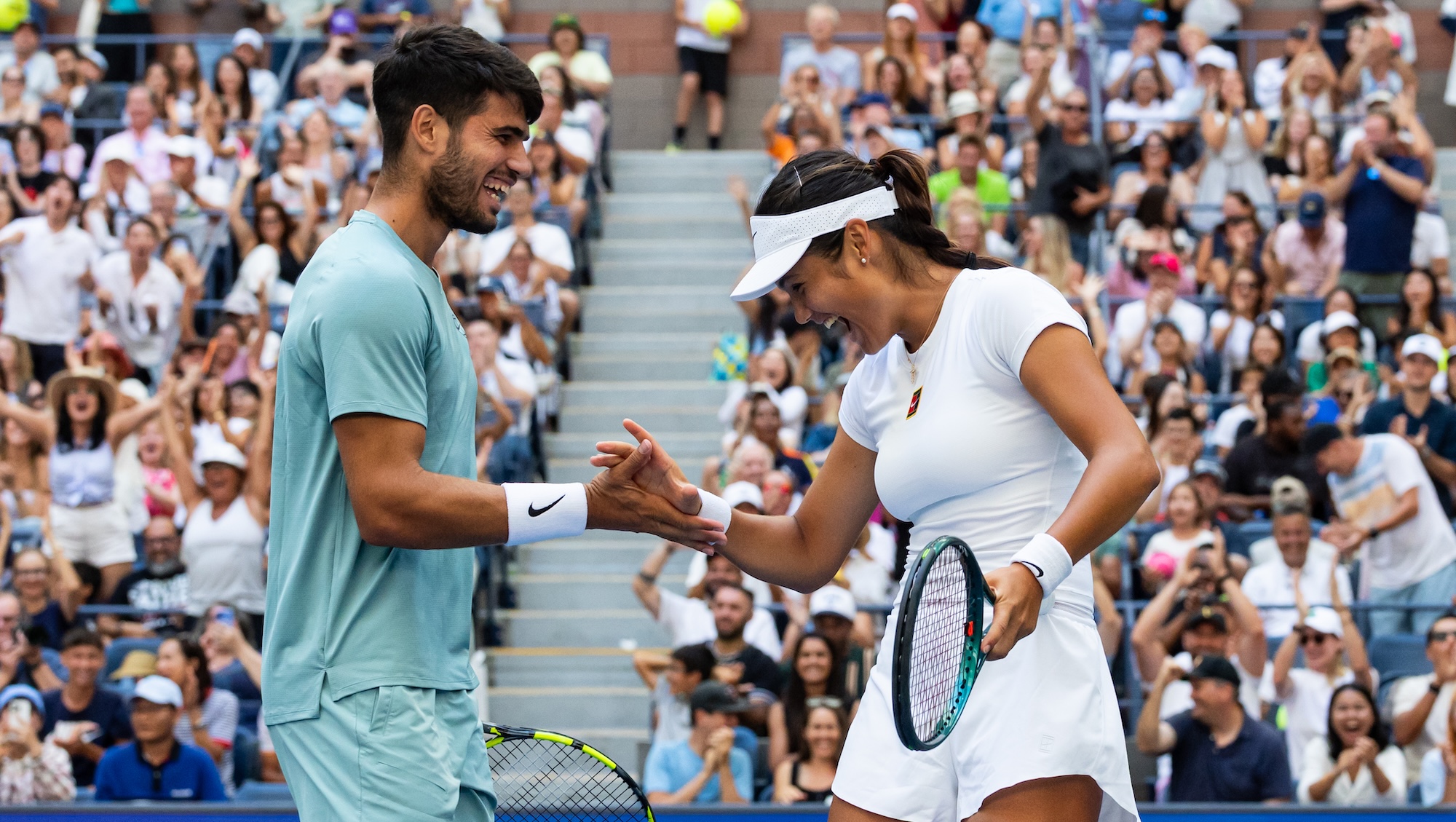 The US Open's controversial 'superstars' doubles format
The US Open's controversial 'superstars' doubles formatTalking Point New shortened competition attracts star pairings and bigger audiences to grand slam tennis event
-
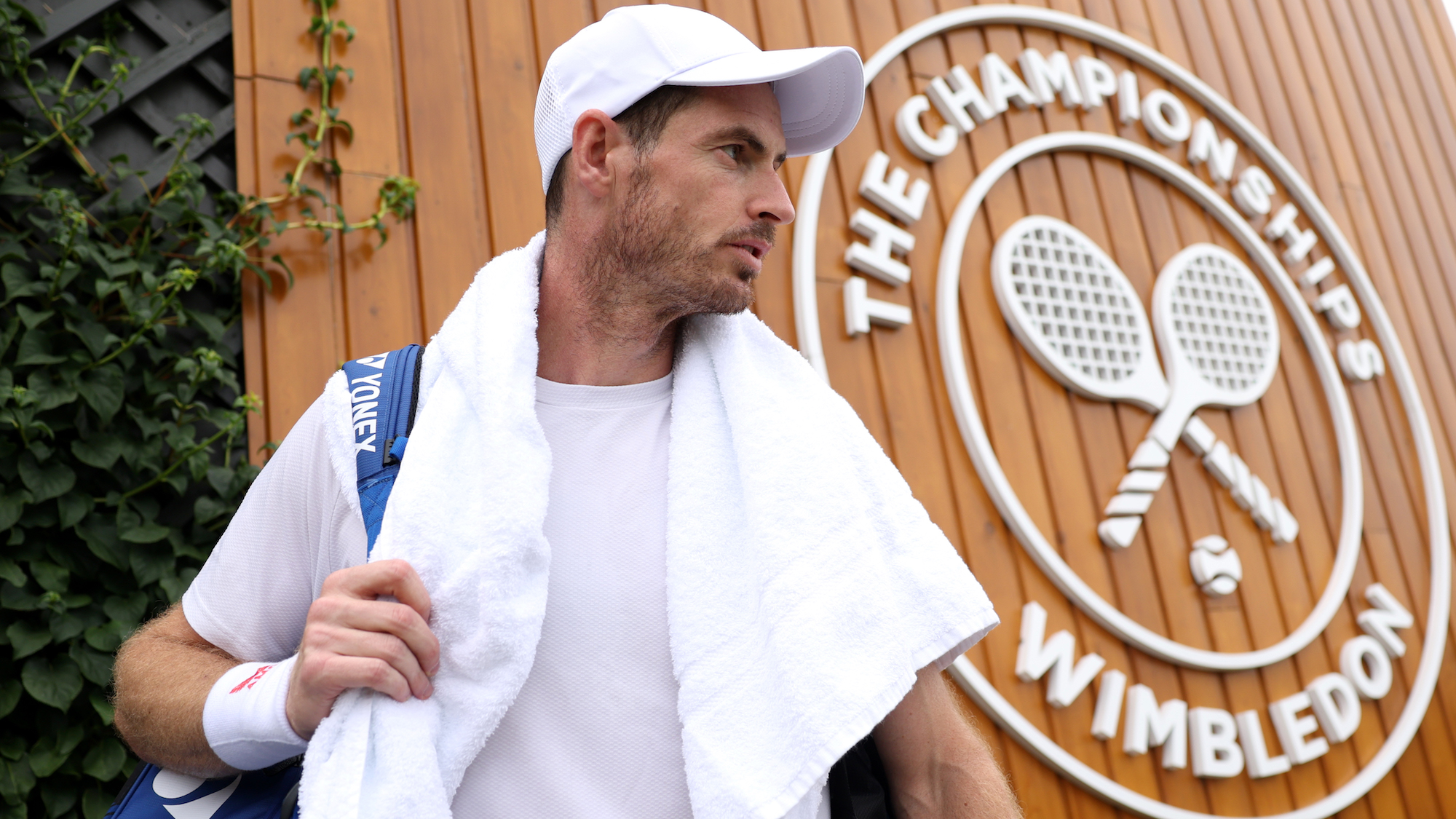 Andy Murray: Britain's greatest sportsperson?
Andy Murray: Britain's greatest sportsperson?Talking Points Injury denies Scot a final singles appearance at Wimbledon but his place in history is assured
-
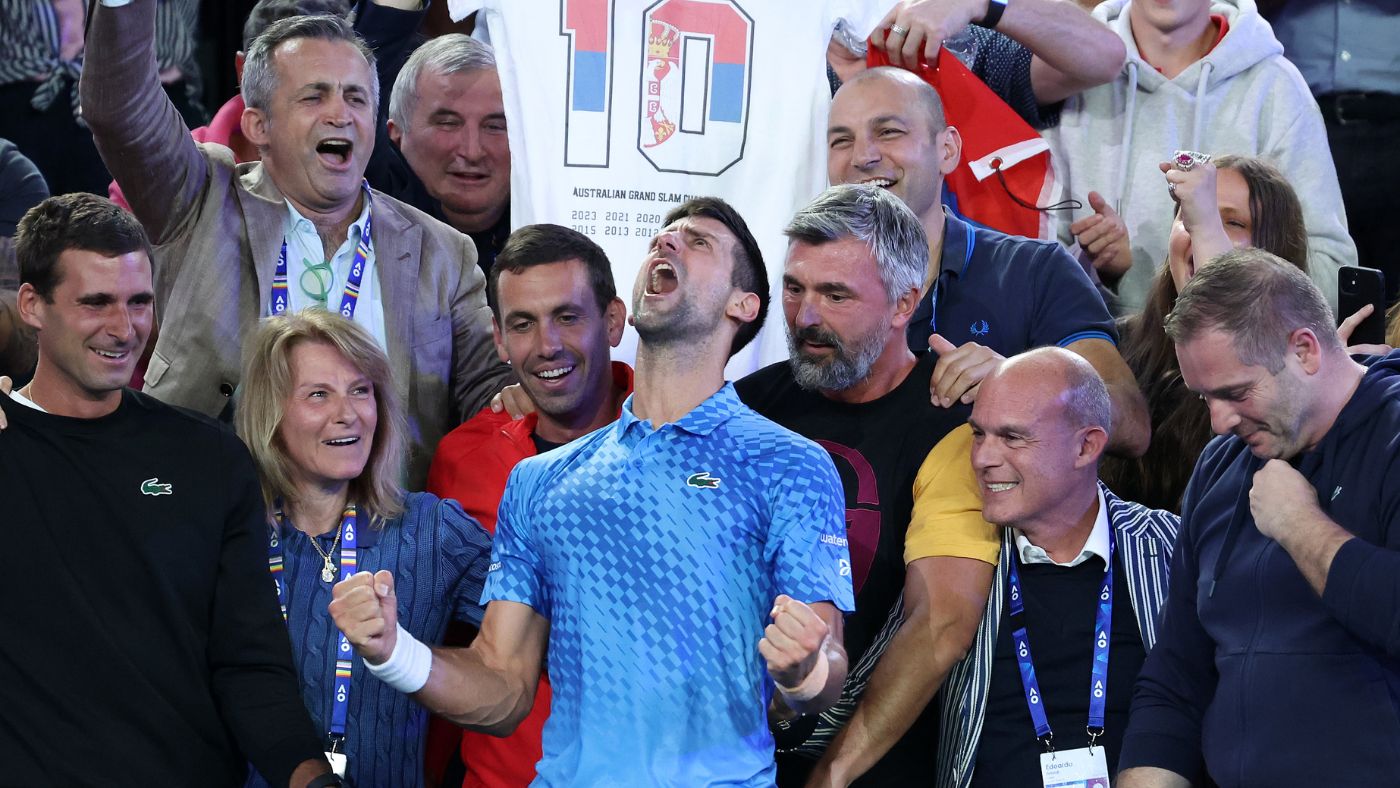 Novak Djokovic is now ‘surely unrivalled’ in tennis history
Novak Djokovic is now ‘surely unrivalled’ in tennis historyTalking Point Serb’s ‘biggest victory’ saw him make history once again in Australia
-
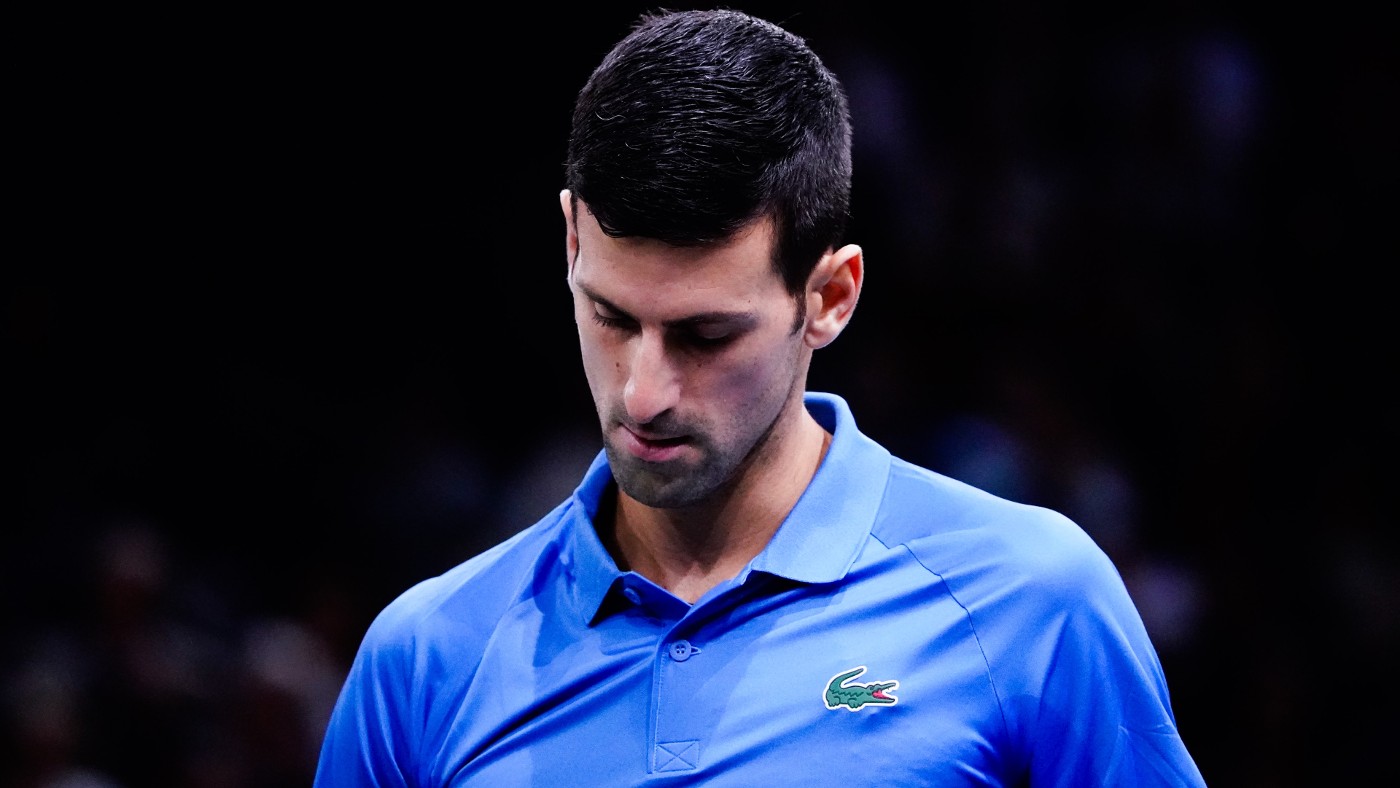 Novak Djokovic’s dad and the pro-Putin ‘Night Wolves’
Novak Djokovic’s dad and the pro-Putin ‘Night Wolves’Talking Point Australian Open episode ‘reflects sense of brotherhood’ between Serbia and Russia
-
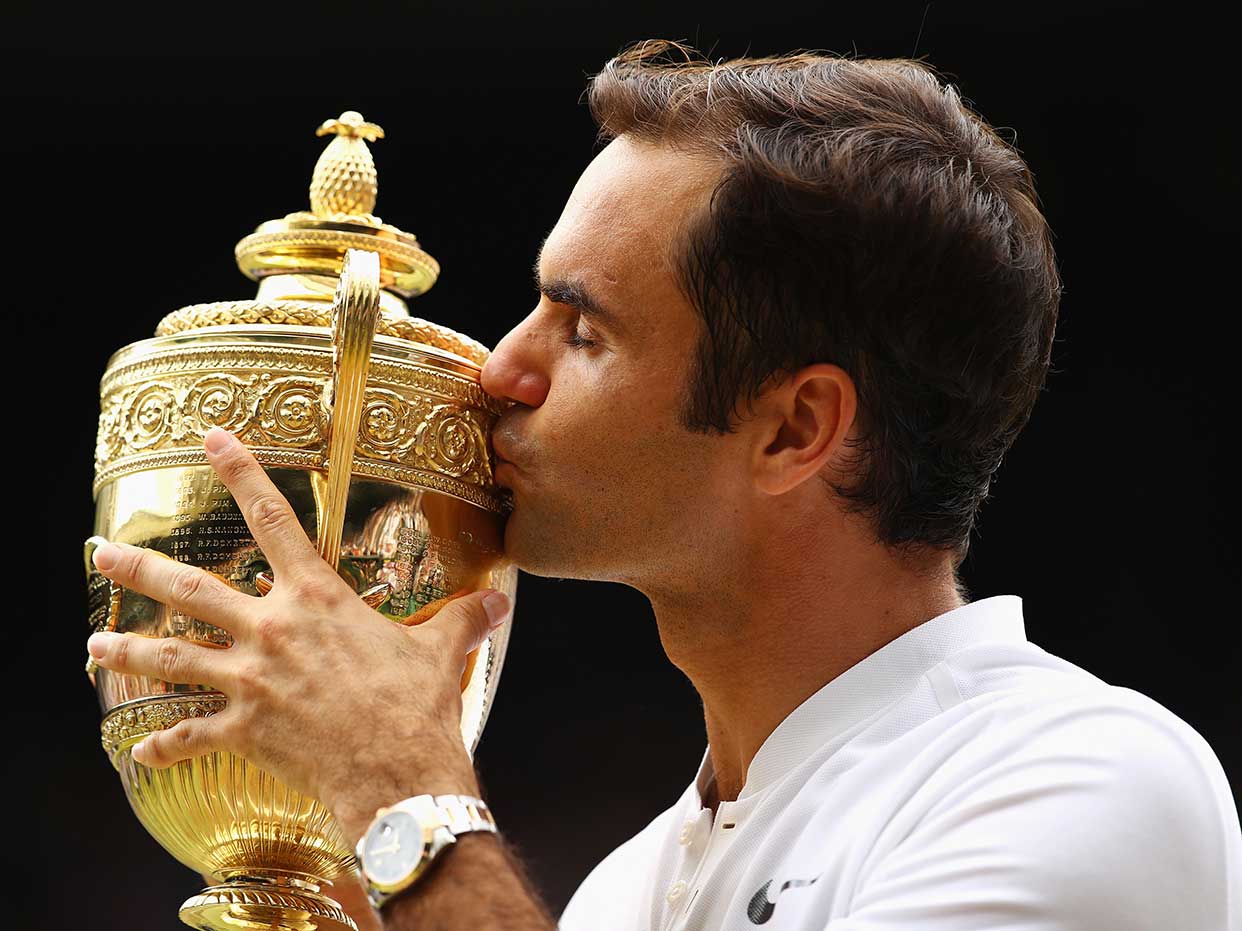 Roger Federer and the ‘GOAT’ debate
Roger Federer and the ‘GOAT’ debateTalking Point Tennis luminaries line up to declare the Swiss the greatest of all time
-
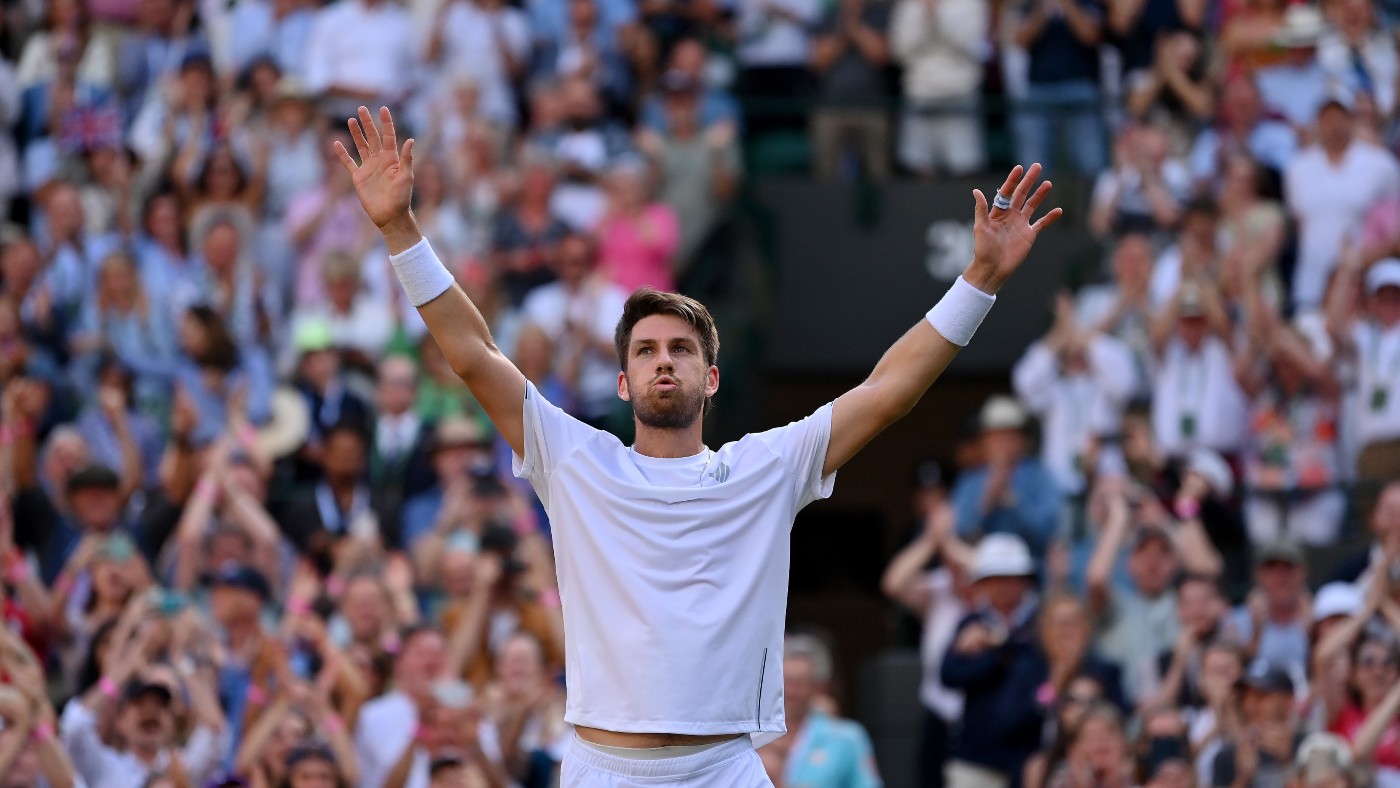 Novak Djokovic vs. Cameron Norrie: Wimbledon semi-final preview and predictions
Novak Djokovic vs. Cameron Norrie: Wimbledon semi-final preview and predictionsfeature Can the British No.1 stun the defending champ and reach Sunday’s final?
-
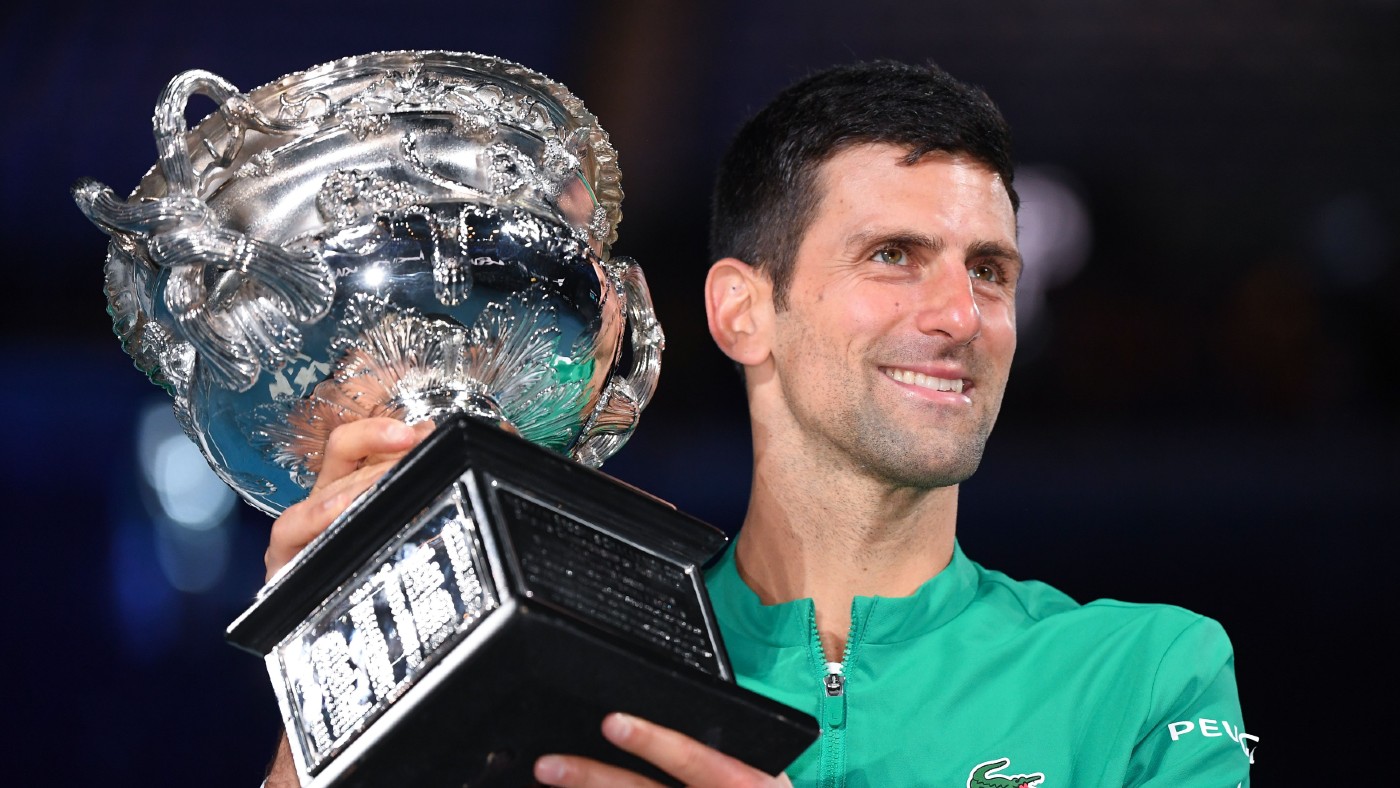 Novak Djovokic on vaccines, grand slams and playing tennis for ‘many more years’
Novak Djovokic on vaccines, grand slams and playing tennis for ‘many more years’feature What the men’s world No.1 said in his interview with the BBC
-
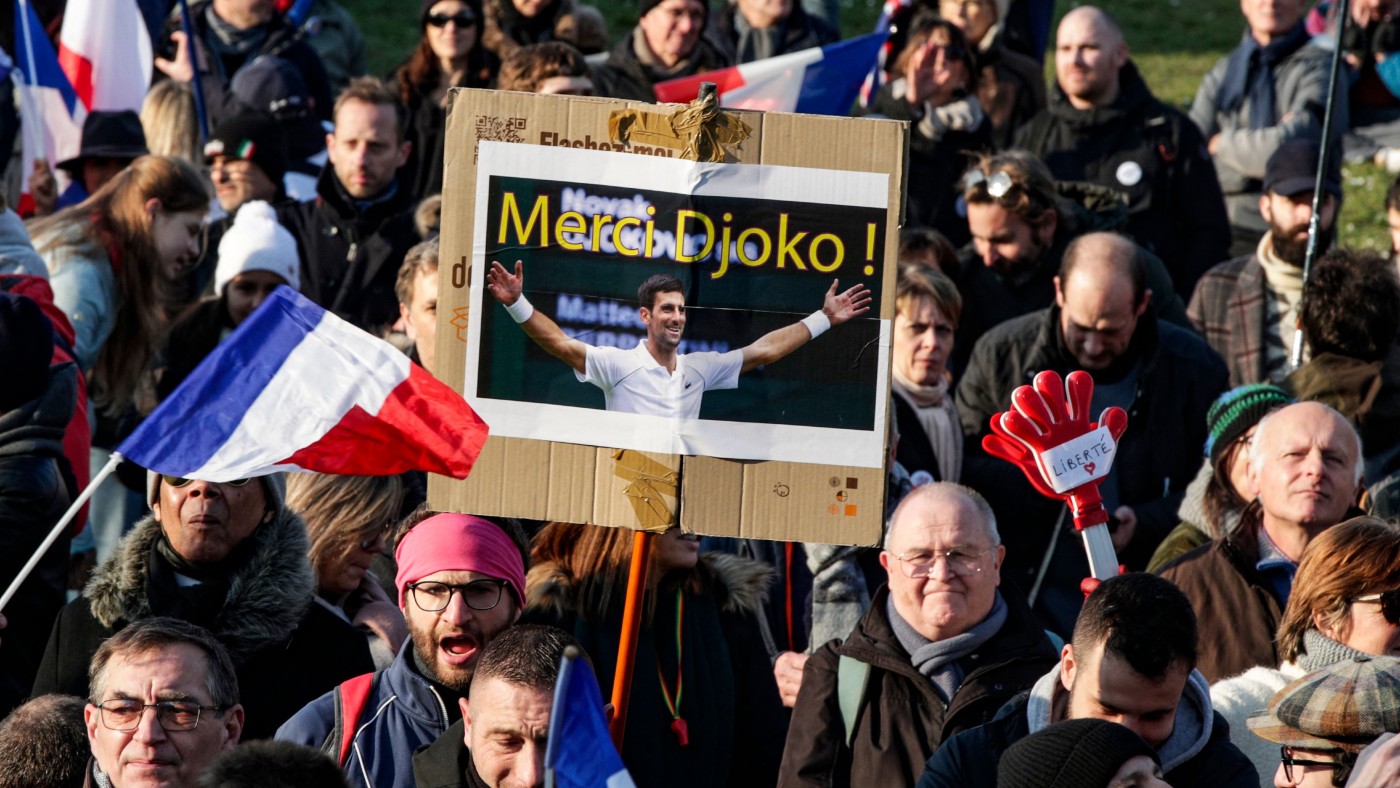 Novak Djokovic: a poster boy for anti-vaxxers?
Novak Djokovic: a poster boy for anti-vaxxers?In the Spotlight The reaction to his deportation from Australia was ‘predictably polarised’